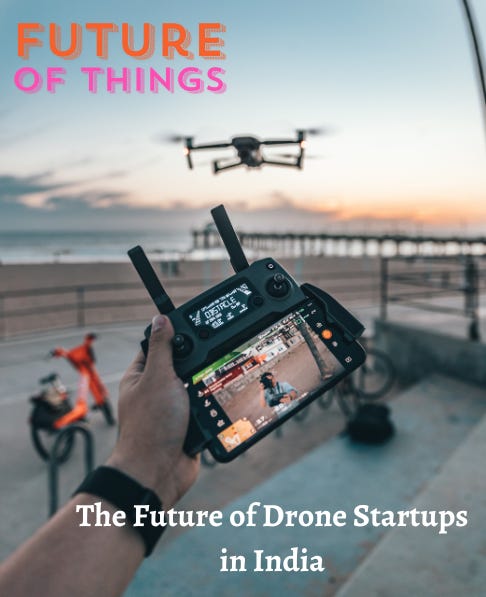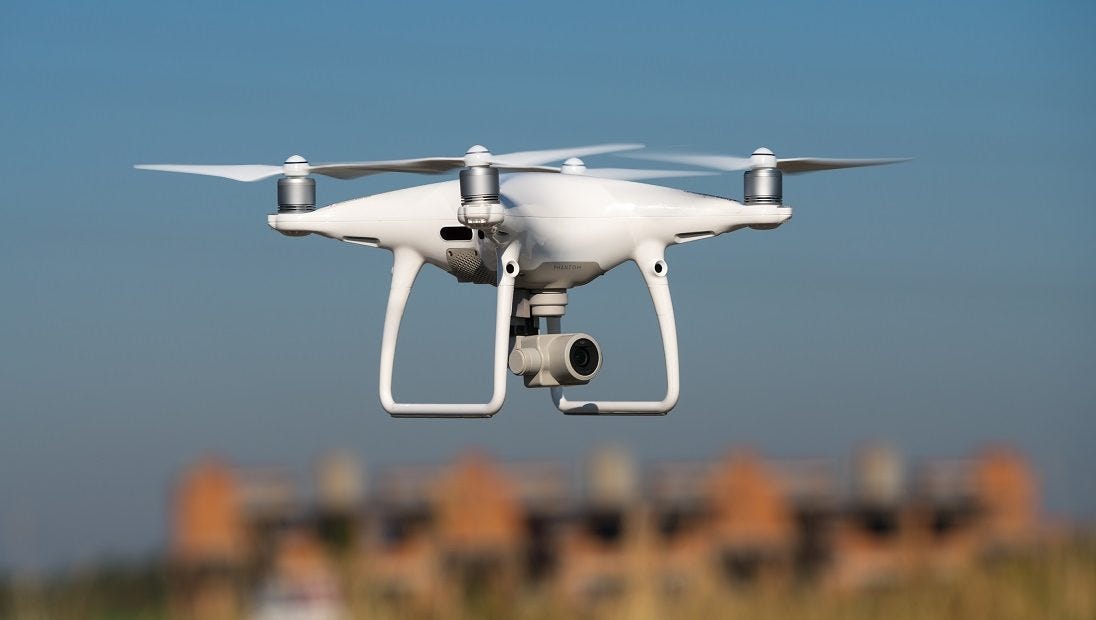The Future of Drone Industry in India
As against what is often shown in futuristic sci-fi movies, there are no drones flying around us when we look up into the sky and most of us have yet not even seen an operational drone in our lives.
The Indian drone industry is brimming with potential, evidenced by the surge in startups. Across multiple reports and sources, it can be estimated that currently there are more than 250 young and mature startups who are working on Drones as an industry, across Healthcare, E-Commerce, Deliveries, Agriculture, Infrastructure, Defence etc. However, even today in 2024, drone application and acceptance has not become widespread and lags behind due to various factors.
As against what is often shown in futuristic sci-fi movies, there are no drones flying around us when we look up into the sky and most of us have yet not even seen an operational drone in our lives.
Let's explore the future of this dynamic, yet not widespread space:
Promising Opportunities:
Market Growth: Estimates project the Indian drone market to reach $13 billion by 2030, driven by government support and diverse applications.
Untapped Sectors: Agriculture, healthcare, infrastructure, and logistics offer immense potential for drone-powered solutions.
Innovation Hub: India can become a global drone hub by focusing on R&D, manufacturing, and talent development.
Current Indian Drone Regulations: A Work in Progress
The Indian government has made significant strides in regulating the drone industry and have introduced multiple regulations, rules and guidelines over the past years to facilitate innovation and development in this space, but there still remains a massive room for improvement.
Existing Regulations:
Digital Sky Platform: Launched in 2021, this platform facilitates drone registration, flight permission requests, and airspace information.
Drone Categories: Drones are categorized by weight and capabilities, influencing registration and permission requirements.
No-Fly Zones: Sensitive areas like airports and government buildings have restricted airspace.
Remote Pilot Licenses (RPLs): Mandatory for commercial operations and certain non-commercial uses.
Unique Identification Number (UIN): Mandatory registration for most drones provides traceability.
However, these regulations are not easy to follow, approval processes are often complex and there remains a looking data privacy concern when it comes to drone industry.
Expanding and Growing: A Roadmap for Drone Startups in India
The Indian drone industry is buzzing with possibilities, but navigating the landscape requires strategic foresight. Here are some key strategies for drone startups to expand and grow:
Sharpen Your Niche:
Identify a specific industry: Drone startups need not be jack-of-all-trades. Instead, the research and innovation, along with application needs focus on a particular sector like agriculture, infrastructure, delivery, or healthcare - as each of them hold immense possibility to grow
Become an expert: Deeply understand the challenges and opportunities within your chosen niche. Develop solutions tailored to those specific needs.
Collaborate with industry players: Partnerships and collaborations go a long way, when you enter a hardware industry which is very R&D driven. Huge amounts of cash if often required to sustain or even go-to market. This can be solved through partnerships and test runs with established companies in your target sector for market access, expertise, and joint ventures.
Embrace Innovation:
Invest in R&D: Stay ahead of the curve by focusing on cutting-edge drone technology, AI integration, and data analytics capabilities. The massive challenge of privacy concern needs to be solved, and that can be done only with innovation and research
Explore emerging trends: Keep up with advancements in battery life, payload capacity, autonomy, and counter-drone measures. Most importantly, Follow the global trends and closely monitor what is happening in the Drone space across the World.
Look beyond the mature markets of US or UK - you might find much more interesting innovations happening in places like Netherlands, Estonia, Germany or France for that matter.
Participate in hackathons and incubators: Network with other innovators, brainstorm ideas, and access resources to fuel your development.
Build Brand Credibility:
Comply with regulations: Demonstrate responsible drone usage by adhering to all legal and safety guidelines. Make this the forefront of your go-to market. Regularly iterate on your compliances, respect for data privacy and legal approvals.
Focus on data privacy: Implement robust data security measures and transparent data handling practices.
Showcase successful case studies: Highlight real-world applications of your drones and the positive impact they create. Focus on generating lot of content around successful application. Widespread application will only be adopted when the usage of Drones is made easy to understand and simple to implement. Demonstrate that regularly with the content that you create.
Partner with industry experts and influencers: Collaborate with trusted individuals to enhance your brand image and reach a wider audience.
Harness Content Marketing Power:
Create informative content: Educate potential clients about drone benefits, applications, and regulatory compliance. Create lot of video content - across massy platforms like YouTube and Instagram. Show DIY videos, applications, installation guides and tips and tricks regularly.
Utilize diverse platforms: Leverage blogs, articles, videos, social media, and webinars to reach your target audience.
Workshops and Webinars: Enter into the learning space and start familiarising people with Drones. Teach them everything from making drones to the build, from research to application and uses. Make the masses comfortable with Drones - both B2B and B2C.
Build an online community: Engage with potential clients, answer questions, and foster trust through interactive content. Become accessible to people.
A big problem with major hardcore technology companies becomes their inaccessibility. Technology has to be made friends with people.
Leverage Government Support:
Stay informed about government initiatives: Track new policies, funding opportunities, and support programs for drone startups.
Participate in government-organized events and workshops: Network with other startups and stakeholders, gain insights, and explore collaboration possibilities.
Advocate for positive regulations: Engage with policymakers and industry bodies to shape regulations that support innovation and growth. Create a strong community and become a voice of the industry and then reach out to government stakeholders.
Embrace Sustainability - The Future of Technology:
Develop eco-friendly drones: Focus on energy-efficient designs, recyclable materials, and responsible manufacturing practices.
Promote sustainable drone applications: Highlight use cases like precision agriculture, environmental monitoring, and disaster relief.
Partner with environmentally conscious organizations: Collaborate with companies committed to sustainability to amplify your impact. Show that you really care about the environment for people to accept Drones at a wider level.
Remember, the Indian drone industry is dynamic. Adaptability, innovation, and a deep understanding of your target market will be key to the success of Drone startups. Embrace the challenges, leverage the opportunities, and contribute to shaping a vibrant and responsible drone ecosystem in India.






